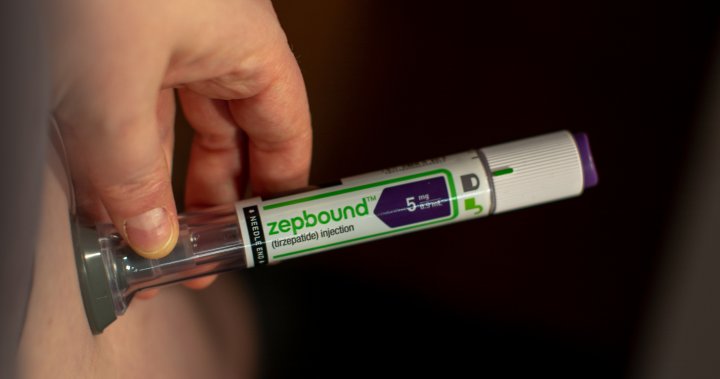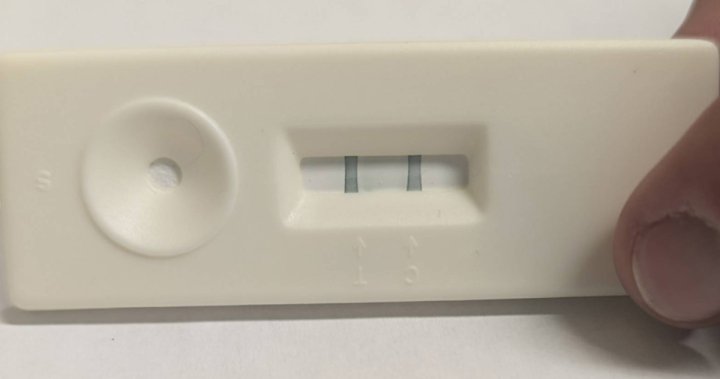Eli Lilly’s weight-loss drug cuts diabetes risk, long-term study finds – National

The drug tirzepatide, made popular for its treatment of Type 2 diabetes and weight loss, lowers the risk of progression to diabetes by 94 per cent among adults with prediabetes and obesity or who are overweight when taken weekly, according to a new study by the drugmaker Eli Lilly.
While the study has not yet been peer-reviewed, experts who spoke with Global News for their views on its findings said the data so far suggests the possibility of risk reduction over the course of years to come.
Results of the three-year study of the drug, also known by its brand names Mounjaro and Zepbound, were released on Tuesday with the report showing weekly injections of any of the three dosage amounts — five, 10 and 15 milligrams — “significantly reduced” the risk of progression, and also saw sustained weight loss.
In fact, those on the 15 mg dose also saw a 22.9 per cent average decrease in body weight compared with just 2.1 per cent among those who took a placebo during the study’s treatment period.
“It is highly significant that this study showed that in those people who had prediabetes,” Dr. Caroline Apovian, co-director of the Center for Weight Management and Wellness at Brigham and Women’s Hospital in Boston, told Global News. “That is a major risk reduction in development of Type 2 diabetes.”
Apovian had no involvement in the study nor with Eli Lilly.

Mounjaro, which has also been approved for use in Canada, is used primarily for diabetes treatment but like its sibling Zepbound has also been approved for weight-loss use.

Get weekly health news
Receive the latest medical news and health information delivered to you every Sunday.
Zepbound was approved in the U.S. last year for people considered obese, with a body mass index of 30 or higher, and those who are overweight with a related health condition, like high blood pressure or diabetes. The Food and Drug Administration said the drug should be paired with a healthy diet and regular exercise.
“Weight loss is not entirely good, you need to maintain one’s strength,” Dr. Tom Elliott, medical director of BC Diabetes, told Global News. “So it’s very important to avoid loss of lean muscle, so that means getting into the gym, having some home weights, making sure our muscles are stronger than ever.”
Tirzepatide works by mimicking hormones that kick in after people eat to regulate appetite and the feeling of fullness. It imitates the hormones glucagon-like peptide-1, known as GLP-1, and glucose-dependent insulinotropic polypeptide, or GIP.
Lilly says that during the study, overall safety and tolerability of the drug was consistent with previously published studies conducted for chronic weight management. Side effects like diarrhea, nausea, constipation and vomiting were the most commonly reported, with the company noting the adverse events were generally mild to moderate in severity.
Apovian said these relatively minor adverse events point to the safety of drugs like tirzepatide and that this is, in turn, is “changing the landscape for obesity treatment.”
“The safety comes from the fact that they are analogs of naturally occurring hormones,” she said. “We understand a lot about the etiology (cause) of obesity to be able to produce a treatment that can physiologically get people to a healthier body weight and still be safe.”
The study was conducted for 176 weeks among 1,032 adults who had pre-diabetes at random and obesity or overweight, followed by a 17-week off-treatment period.

But that off-week period raises some concerns as during that time the study found participants began to regain weight. However, it notes that while there was also some increase in the progression to Type 2 diabetes, there was still an 88 per cent lower risk of developing diabetes compared with those taking the placebo.
Elliott told Global News that weight loss success and prevention of diabetes does not just come from taking tirzepatide or other iterations of diabetes and weight-loss drugs like semaglutide.
“It does require discipline,” Elliott said. “If you’re not going to work hard on the primaries of eating less and exercising more, then if you come off one of these drugs, Ozempic or Mounjaro or whatever the new flavour is … you will regain weight and lose what advantage you’ve gained.”
Elliott was not involved in this study but did disclose he has been involved in clinical trials in the past 20 years for Eli Lilly.
The possibility of regaining weight may raise the question of having to remain on a drug like tirzepatide for life so as to avoid that weight gain.
However, Apovian said in addition to the drug’s safety profile, there are other benefits in the long term because obesity is a disease that can lead to other problems.
“The good news is if you’re on them (tirzepatide) lifelong, you may not have to be on lisinopril for your blood pressure and other diabetes drugs because you develop diabetes and heart drugs because you have heart disease now. So that’s the whole point,” she said.
The results of the study will be submitted to a peer-reviewed journal and will be presented at the ObesityWeek medical conference in November.
© 2024 Global News, a division of Corus Entertainment Inc.








